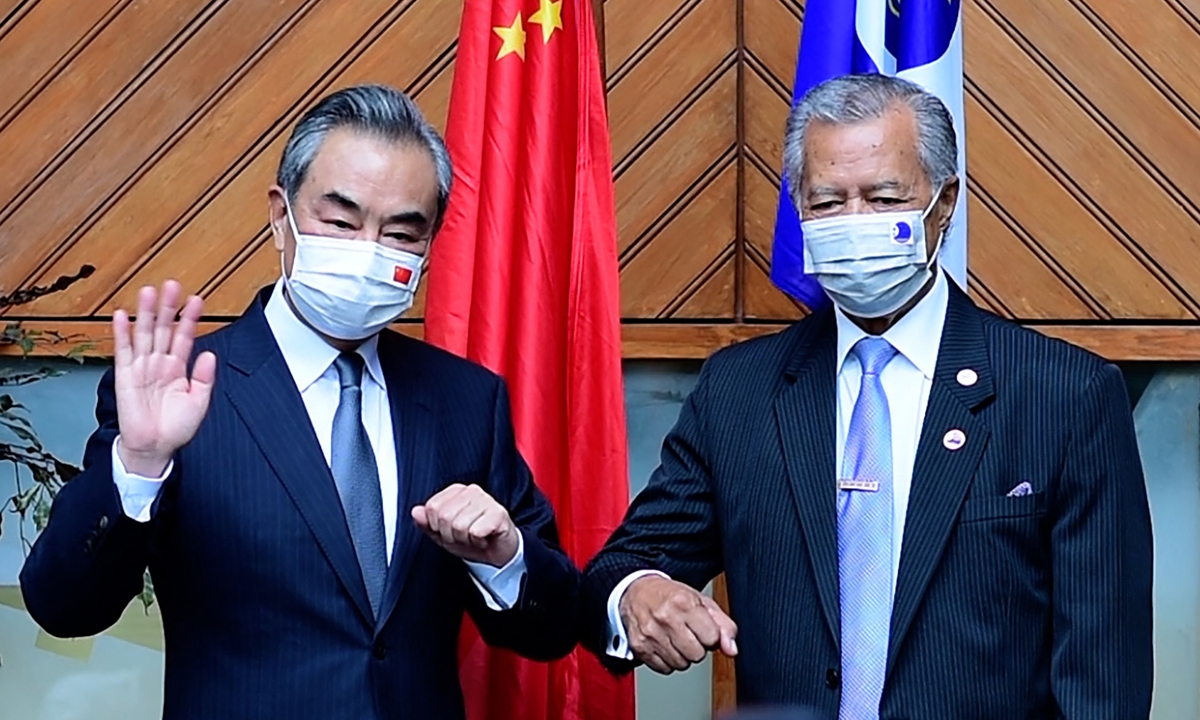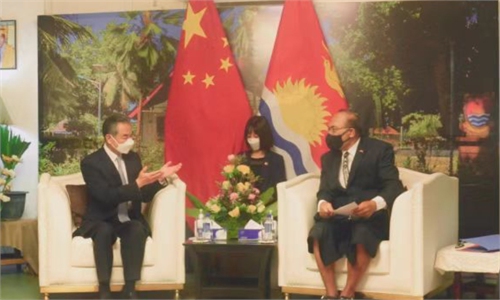IN-DEPTH / IN-DEPTH
Assumption of Kiribati’s exit from Pacific Islands Forum a decision coerced by China untrue: Kiribati Secretary of FM

Chinese State Councilor and Foreign Minister Wang Yi (left) and Secretary-General of the Pacific Islands Forum Henry Puna pose for a picture during their meeting in Suva, capital of Fiji, on May 29, 2022.
Any assumption that Kiribati's decision to quit the Pacific Islands Forum (PIF) is influenced by China is absolutely untrue, Kiribati's Secretary of Ministry of Foreign Affairs and Immigration, Michael Foon, told the Global Times on Thursday, brushing off such geopolitical speculations, after certain Western media outlets connected Kiribati's withdrawal from the PIF to China to paint the latter as a disrupter to regional solidarity.
"A sovereign decision [by Kiribati] must be understood as being sovereign, and I can confirm that it has absolutely no bearing on any external party. Any assumption that it is influenced or coerced is absolutely inaccurate and untrue," Foon told the Global Times.
Despite Kiribati president listing four reasons for the withdrawal, including discontent over power distributions in the PIF framework, New Zealand outlet 1News said "there are growing suspicions Beijing is behind the country's exit," because Kiribati is strategically important to China due to nearby US Military installations and marine resources.
The Guardian cited Kiribati's opposition leader as saying that the country's withdrawal was driven by pressure from China. Similarly, CNN also cited a British scholar to claim "there are China's instructions behind Kiribati's withdrawal."
"The reports lack basic factual support. Some media outlets always interpret things through a Cold War lens in seeing the China- Pacific island countries (PICs) cooperation. They have hyped Kiribati's plan to reopen a protected marine zone for fishing and to upgrade an airstrip on Canton island, to slander China, ignoring Kiribati's official statement," the Chinese Embassy in Kiribati said in a statement sent to the Global Times.
China and the PIF have cooperated well, and the relations between China and the island countries have maintained a healthy and stable development. China adheres to mutual respect and equal treatment principles, and never interferes in the internal affairs of PICs. China hopes that the PICs will strengthen solidarity and cooperation to achieve common development, read the statement.
The International Department of the CPC Central Committee held the second PICs-China Political Leadership Dialogue via video link on Thursday. Leaders of political parties from the PICs said that China's successful experience provides important lessons for the PICs to achieve prosperity and development. Political parties from PICs will firmly adhere to the one-China principle, to promote the Belt and Road Initiative(BRI), and jointly build a community with a shared future for mankind.
When leaders of Pacific island nations met in person for the first time since the COVID-19 global pandemic at the PIF in Suva, Fiji to discuss issues key to regional development, the US announced a raft of measures including two embassies and more funding to boost engagement with the PICs in a bid to counter China's influence and presence in the region.
US Vice President Kamala Harris made a virtual appearance at a fishing-themed panel under the PIF on Wednesday and announced the US will establish two new embassies in Tonga and Kiribati, according to a press release on Wednesday from the White House.
PICs tend not to take sides between China and the US, but have seen through US attempts to turn the South Pacific into the battlefront of competition against China, observers said.
Foon said that despite the decision of withdrawal, Kiribati will not isolate itself from Pacific affairs, and is still a member of a number of other regional organizations.
"We will not always agree as Pacific brothers and sisters, but we will always work with each other in areas of mutual interests regardless of whether we are part of a formal grouping or not, and this is particularly important in the bilateral space. After all, we have a strong bond that holds us together, even in times of disagreement," said Foon.
"Our engagement with these regional bodies will be guided by our national interests, similar to any other nation, and be driven by a development agenda that is equitable, fair, inclusive, and respects our collective and unique interests," Foon noted.


